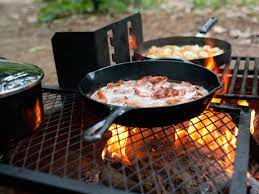When camping, top priority should be making sure our food remains edible. Novice campers might not pay attention to it, but there are plenty of disease-causing microorganisms in nature that could affect your trip if? not careful. For this, we’ve compiled a list of useful tips that every person looking to venture into the outdoors should follow.
Keep Food at Its Optimal Temperature
Refrigeration’s significance cannot be overstated. Microbes, insects, and other creatures that ruin food and cause sickness may all be avoided with proper refrigeration. A food thermometer should be as important as any other camping tool or equipment, so don’t forget to bring yours whenever you go on an adventure. Keeping your food fresh is the most effective way to ensure its safety.
Using a Camping Refrigerator
A solid line of defense against foodborne disease is a high-quality insulated camping cooler or camping cooler. A cooler will keep your food chilled while preventing animals, viruses, and other contaminants from getting into it.
When it comes to camping food refrigeration, you have a lot of alternatives. Although some solutions are better than others, there are a few simple, easy-to-apply low temperatures that may be used to preserve food while camping. This Rio by Shelter Logic steel coolers are one of the most popular choices among veteran campers. These work well in terms of keeping food fresh and preventing the spread of germs.
Take Care of Meat Temperature and Cooking
It’s not suggested to refreeze meats and other comparable goods once they have been defrosted, since they may be contaminated. Foods that aren’t kept at 40°F or lower can’t be cooked consistently enough to be safe. Lunch meats are designed to be eaten cold and might be your best bet if you’ve never cooked outside before.
Cooked meat should also be handled with caution at all times. When preparing meats, it’s important to try your best to maintain the greatest level of sanitation possible and avoid any contact with insects or animals. If you’re following a recipe from a camping handbook, it’s very possible that you’ll find what the internal temperature of the meat should be.
Keep a Clean Environment
Bacteria have a bad reputation for spreading in dirty environments. That’s why it’s so important to keep good hygiene at all times — especially if you’re handling food. Soap, water, clean towels, and hand sanitizer should all be brought when you go camping; they can be your best friends at cooking time. Before preparing and consuming food, always wash your hands, utensils, and all surfaces the food is going to be in contact with.
Remember that hygiene doesn’t end when lunch is over! Even when you’re washing dishes and cleaning up the campground, you need to keep food safety in mind. And not only the food, but the natural environment you’re in. Biodegradable camping soap is available; however, it should be used sparingly and kept away from water, as it will contaminate it. Dishes should be washed at the campground rather than at the water’s edge, and all water should be filtered.
Nothing can put a cramp on your next camping trip like an unwanted case of food poisoning. However, by being careful — and following these guidelines — you can help make sure your next foray into the woods is fun for yourself and the whole family!



